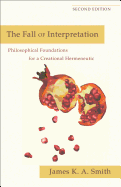I’m profoundly grateful to these scholars for taking time to carefully, critically, and charitably engage the second edition of The Fall of Interpretation—and in the summer, of all things! This kind of constructive engagement is a real gift to an author, and I’m glad to have the opportunity to continue the conversation by replying to each.
As I’ve come to expect, Mark Bowald has taught me things about myself by bringing my younger self into conversation with my older (slightly balder) persona, reading the first book in my corpus in light of the later texts. I was doing this myself somewhat while I edited this new edition, and felt some of the tensions and lacunae he points out—though I think the new Introduction and final chapter fill out the picture in a way that accords much more with my later work.
Let’s just consider Mark’s point about sin and its effect on interpretation. I think his invocation of the well-worn structure/direction distinction is helpful and illuminating in this context. (The structure/direction distinction is a roughly Augustinian idea that even a good structure of creation can be twisted and perverted in disordered, evil directions. As Augustine often puts it, ontologically speaking, even the devil is “good.” It’s what he does with that gift of being that’s the problem.)
I think Mark is right: I do spend the bulk of my argument trying to get folks to see that interpretation is inherent to the good structure of creation. That leaves two questions: (1) Do I therefore over-read Lints, mis-reading his concern about “directional” sin as if it were “structural” sin? (2) Do I ever really give an account of the directional impact of sin on the (nonetheless good) structure of hermeneutic being-in-the-world? Let’s attend to these in turn.
(1) I don’t mean to be stubborn, but I think my reading of Lints still stands (though Mark is surely right that my reading of him is not as charitable as it perhaps could be). While Mark provides some further context from Lints, I don’t think his attribution to Lints of a “directional” concern adequately explains other passages that I quote on pp. 50-51 of The Fall of Interpretation: Lints attributes “perfect clarity” to Adam and Eve, bemoans the influence of such “filters,” and says that God’s speech “breaks through” such filters. Now, could Lints articulate a model that is not susceptible to my critique—and more akin to what Mark suggests? Yes, I think he could. But if he was really trying to do that, then what I’d hope to hear is a sense that redemption is about good filters, not redemption “from” the influence of filters. Or he could speak positively about tradition, rather than associating tradition only with the Pharisees. These would be interesting questions to put to Lints. But as it stands, I think his portrayal of interpretation is at best ambiguous; and I see tells that tip it in the direction of an “immediacy” hermeneutic.
(2) But the second question is more important: Do I ever really account for the effect of sin on (the good structure of) interpretation? Or even worse, as Mark seems to hint: does my affirmation of the goodness of interpretation (structure) lead me to naively affirm bad interpretive practices (direction)?
Well, I sure hope the latter’s not true. But I concede that this is not a focus of even the second edition. Here permit me to simply highlight a place where I do address this important question, but buried in a footnote (p. 25n.25):
The burden of my argument was to emphasize the goodness of interpretation as a feature of a good, finite creation. But this does not insulate interpretation from the effects of the Fall; it just means that interpretation is not a result or outcome of the Fall. If we can speak of the “noetic effects” of sin, we could certainly also countenance the “hermeneutic effects” of sin. It is humans who interpret. Trees don’t interpret, though they are interpreted. Insofar as it is humans who are interpreters, then the Fall affects interpretation insofar as it affects human beings. In particular, we would have to consider how sin and the Fall disorders human love (per Augustine’s account in City of God). If charity is a condition of good interpretation, then the disordering of charity would obviously corrupt and distort interpretation. (For a relevant discussion, see Alan Jacobs, A Theology of Reading: The Hermeneutics of Love [Boulder, CO: Westview Press, 2001].) The lack of charity and disordering of love can find expression in the desire to dominate and control, to repress and suppress the truth. This would be true not only of “lingual” or “textual interpretation, but even our construal of objects and the natural world. As fallen, I might tend to distort or misinterpret phenomena because, in some sense, I don’t want them to be what they are, or because I want them to be more than they are (idolization). The “redemption” of interpretation, then, would not be a redemption from interpretation, but a redemption of our will and a reordering of our love, enabling us to construe well.
But Mark’s certainly right that this is underdeveloped in Fall, and needs more work (e.g., amplifying this to institutions, systems, traditions, etc). Maybe a Bowald book on theological interpretation could include this?